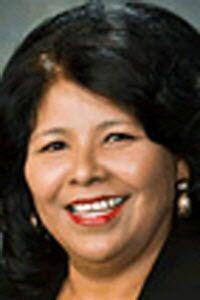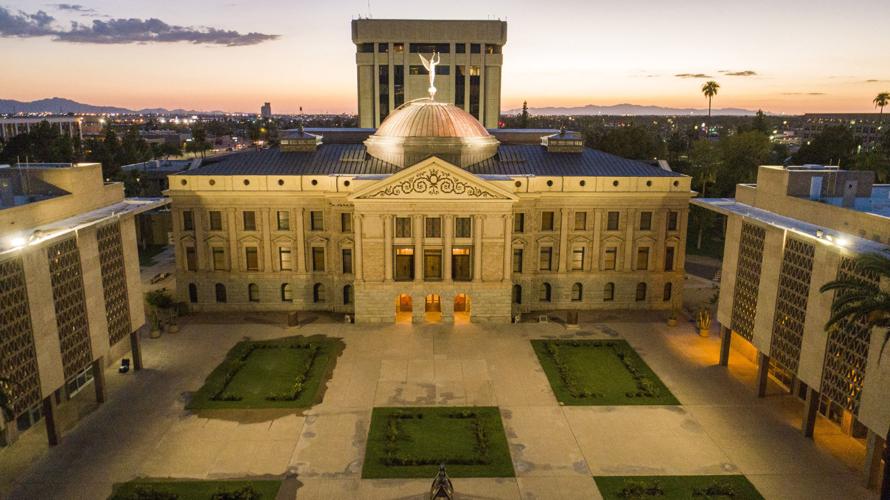When Arizona’s Legislature grew to 30 members of the Senate and 60 members of the House, the state had about 1.7 million residents.
That first session with the new numbers was in 1967. A court ruling requiring districts of equal population had led a judge to change how Arizona apportions the Legislature.
Since then, the state population has grown to about 7.4 million.
But you know what hasn’t grown? The Legislature.
In 2012, the Italian luxury liner Costa Concordia ran aground off the Tuscan island of Giglio and flipped onto its side, and more events that happened on this day in history.
In 1967, each member of the House and Senate represented around 57,000 people. Now, there are about 247,000 people per legislative district.
That doesn’t make any sense — in a couple of ways. And a new referendum proposed by Chandler Republican state Sen. J.D. Mesnard attempts to fix the problems, over time.
Mesnard, himself a former speaker of the state House, has introduced a proposal, SCR 1005, that would leave the Senate the same size, at 30, but expand the state House to 90 members.
Each Senate district would be divided into three geographically separate districts for House members.
Mesnard told me he thinks Arizona’s population growth justifies the move, and he doesn’t expect the change to give any particular interest group an advantage.
“I think it would add stability to the membership,” he said. “It would in many ways more accurately reflect the partisan makeup of the population, I suppose. But mostly I just want to be sure that legislators can represent a reasonable number of people.”
In my view, the only problem with the proposal, which would be decided on by the voters, is the timeline. It would not take effect until the 2032 election for the 2033 Legislature, which is a long time from now.
But Mesnard is worried in part about expanding the House building to accommodate the 30 additional members. And Mesnard’s proposal still solves two big problems.
One is the fact that Arizona’s legislators represent way too many people. Take a look at the four states closest to Arizona’s population and the number of people in their lower chamber:
Washington: 98 House members
Massachusetts: 160 House members
Tennessee: 99 House members
Indiana: 100 House members
Or take take a look at the issue from another angle. The only states with a greater population per House member are California, Texas, Florida and New York — the four most populous states in the country.
But it’s not just that Arizona has too few representatives for so much population.
The weird quirk of Arizona’s apportionment is that each district has two House members representing the exact same area, along with a senator. Only a handful of other states have similar, redundant systems.
Why should two House members represent the same group of people, when one could represent half the number, and constituents would have a better chance at access?
Rep. Daniel Hernandez told me that the “seatmate” arrangement of having two members representing the same district can be beneficial. He said he and newly elected Rep. Andrea Dalessandro, both Democrats, are communicating a lot and tag-teaming on different issues.
But that isn’t a universal experience.
“There are districts where the seatmates haven’t spoken with each other in years,” he said.
Hernandez is reluctant to support Mesnard’s proposal, in part because it would require a big expansion of the House building, which would require money he can’t imagine being allocated.
But that’s actually an ulterior motive to support it for me. Beyond the issues of adequate representation, I also hate the state Capitol.
I’m not talking here about the historic state Capitol, which houses the Arizona Capitol Museum, and which people often mistake for the working Capitol buildings.
No, I’m talking about the House and Senate buildings, which opened in 1960 and stand in front of and to the sides of that historic structure. They are ugly, crowded and notorious for problems.
Frankly, they are embarrassing for the state, which ought to spend the money to construct a new legislative complex that the people of Arizona can be proud of.
It would also be a good way to celebrate the new system and plan for new growth.
Get to know your Arizona lawmakers:
Get to know your Arizona lawmakers
District 2
Updated
Senator Rosanna Gabaldon (D)
Committee Assignments: Commerce; Health and Human Services; Transportation and Technology
Phone: 602-926-3424
Email: RGABALDON@azleg.gov
District 2
Updated
Andrea Dalessandro
, candidate for Arizona House of Representatives, District 2.
Rep. Andrea Dalessandro (D)
Committee Assignments: Land, Agriculture and Rural Affairs; Natural Resources, Energy and Water
Phone: 602-926-5342
Email: ADALESSANDRO@azleg.gov
District 2
Updated
Rep. Daniel Hernandez Jr. (D)
Committee Assignments: Education; Military Affairs and Public Safety
Phone: 602-926-4840
Email: DHERNANDEZ@azleg.gov
2020 Candidate Chats: AZ Legislative District 2
UpdatedCandidates for Arizona's House of Representatives Legislative District 2 include Democratic candidates Daniel Hernandez Jr. and Andrea Dalessandro, as well as Republican Deborah McEwen. Candidates for the lone LD2 Senate seat are Democrat Rosanna Gabaldon and Republican Mark Workman.
District 3
Updated
Senator Sally Ann Gonzales (D)
Committee Assignments: Education; Health and Human Services
Phone: 602-926-3278
Email: SGONZALES@azleg.gov
District 3
Updated
Andres Cano (D)
Committee Assignments: Natural Resources, Energy & Water; Ways and Means
Phone: 602-926-3027
Email: ACANO@azleg.gov
District 3
Updated
Alma Hernandez (D)
Committee Assignments: Criminal Justice Reform; Health and Human Services
Phone: 602-926-3136
Email: AHERNANDEZ@azleg.gov
District 9
Updated
Senator Victoria Steele (D) (Minority Whip)
Committee Assignments: Natural Resources, Energy and Water; Transportation and Technology
Phone: 602-926-5683
Email: VSTEELE@azleg.gov
District 9
Updated
Rep. Randall Friese (D)
Committee Assignments: Appropriations; Health and Human Services
Phone: 602-926-3138
Email: RFRIESE@azleg.gov
District 9
Updated
Rep. Pamela Powers Hannley
Committee Assignments: Commerce; Ways and Means
Phone: 602-926-4848
Email: PPOWERSHANNLEY@azleg.gov
2020 Candidate Chats: AZ Legislative District 9
UpdatedCandidates for Arizona's House of Representatives Legislative District 9 include Democratic incumbents Dr. Randall Friese and Pamela Powers Hannley, as well as challenger Brendan Lyons.
District 10 Kristen Engel
Updated
Senator Kirsten Engel (D)
Committee Assignments: Finance; Judiciary; National Resources, Energy and Water
Phone: 602-926-5178
Email: KENGEL@azleg.gov
District 10 Domingo DeGrazia
Updated
Rep. Domingo DeGrazia (D) (Minority Whip)
Committee Assignments: Judiciary; Rules
Phone: 602-926-3153
Email: DDEGRAZIA@azleg.gov
District 10 Stephanie Stahl Hamilton
Updated
Rep. Stephanie Stahl Hamilton (D)
Committee Assignments: Government and Elections; Natural Resources, Energy and Water
Phone: 602-926-3279
Email: SSTAHLHAMILTON@azleg.gov
2020 Candidate Chats: AZ Legislative District 10
UpdatedCandidates for Arizona's House of Representatives Legislative District 10 include Democrats Domingo DeGrazia (incumbent) and Stephanie Stahl Hamilton, as well as Republicans Michael Hicks and Mabelle Gummere. There are two seats up for grab in each legislative district. Candidates for the lone Arizona State Senate seat in LD10 are Democrat Kirsten Engel and Republican Justine Wadsack.
District 11
Updated
Senator Vince Leach (R) (President Pro Tempore)
Committee Assignments: Appropriations; Finance; Judiciary; Rules
Phone: 602-926-3106
Email: VLEACH@azleg.gov
District 11
Updated
Rep. Mark Finchem (R)
Committee Assignments: Judiciary; Military Affairs and Public Safety; Natural Resources, Energy and Water
Phone: 602-926-3122
Email: MFINCHEM@azleg.gov
District 11
Updated
Rep. Bret Roberts (R)
Committee Assignments: Criminal Justice Reform; Education; Military Affairs and Public Safety
Phone: 602-926-3158
Email: BROBERTS@azleg.gov
2020 Candidate Chats: AZ Legislative District 11
UpdatedDistrict 14
Updated
Senator David Gowan (R)
Committee Assignments: Appropriations; Natural Resources, Energy and Water
Phone: 602-926-5154
Email: DGOWAN@azleg.gov
District 14
Updated
Rep. Gail Griffin (R)
Committee Assignments: Natural Resources, Energy and Water; Land, Agriculture and Rural Affairs
Phone: 602-926-5895
Email: GGRIFFIN@azleg.gov
District 14
Updated
Rep. Becky A. Nutt (R)
Committee Assignments: Rules; Appropriations; Commerce
Phone: 602-926-4852
Email: BNUTT@azleg.gov







